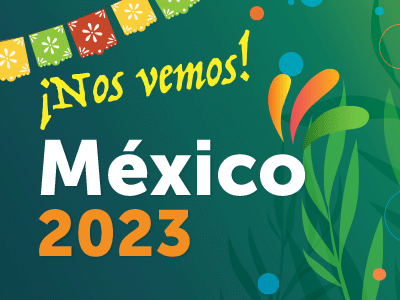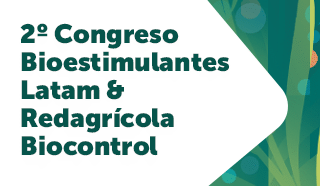01/Apr/2022
#04
SUBSCRIBE TO OUR NEWSLETTER
Suscríbete a nuestro newsletter
Last issue articles
- Biome: the space gaining protagonism in biological strategies for crops
- The export dynamics driving the Mexican biologicals market
- New model developed to evaluate effects of two or more biostimulants combined in a single crop
- Dr. Wagner Bettiol and the biocontrol market in Brazil
- Las propiedades que hacen del Trichoderma un socio clave en la búsqueda de mejores desempeños en los cultivos
- Changes in the new regulation on fertilizers and biostimulants in Chile
- Innovak Global, the expansion of root specialists
Market movers
- Renewable-based nitrogen fertilizer firm raises US$ 20 million in investment round
- Bayer and Ginkgo Bioworks close agreement to strengthen open innovation platform for agricultural biologics
- Argentinean firm Puna Bio: Millions raised to study superbacteria for agricultural use
- Corteva Agriscience signed an agreement to acquire leading biologics company Symborg
- Brazilian study uncovers ants' potential in crop protection
- Huber acquires specialty plant nutrition producer Biolchim
- UPL announces agreement to distribute bioprotector based on orange oil
- ICL and Lavie Bio start strategic collaboration to develop new biostimulants
- Hortitool and Green Smile to organize the Morocco Berry Conference 2022

Microbiome analysis: the strategic info for a bio-input strategy
Alberto Acedo, founder and chief scientist of Biome Makers, explains the relevance of the analysis of microorganisms in the soil for a bioinputs strategy. His vision will be one of the protagonists of the first series of Biostimulants and Biocontrol to be presented by Redagrícola on April 28th.
Biologicals Latam
The interactions between microorganisms living in soil can be studied just like the networks between people on a social platform like Facebook, Twitter or Instagram.
This is pointed out by Spanish scientist Alberto Acedo, who says that knowing and studying the relationships between the microscopic bacteria and fungi that live under crops can make it possible to predict their behavior and, incidentally, anticipate which biological product for nutrition or protection is the most suitable for a specific plantation. "The same algorithms that social networks use to understand human relations, we use them to understand the interaction between microorganisms," says Acedo, who is founder and chief scientist (CSO) of the Californian firm Biome Makers.
As its name suggests, the firm, founded in California in 2015, studies and recommends actions to manage the microbiome, the set of microscopic bacteria and fungi that live in soil and are the key to the effectiveness of botanical solutions applied to crops. Some of their conclusions will be presented in a lecture in the first of six series of Biostimulants and Biocontrol that Redagrícola will present throughout 2022, with the aim of presenting the latest advances in biological inputs for the field.
In his presentation, which will take place on April 28, Acedo will explain the unique and outstanding effort that Biome Makers has made in leaning about, identifying, and classifying the microorganisms that live in soils used for agriculture. “Some 350,000 species of bacteria and 150,000 species of fungi are recognized in scientific databases,” says Acedo. "By collecting samples from thousands of different crops from around the world, we have already registered 10 million different organisms."

The Californian firm has recorded DNA strands from some 10 million microscopic bacteria and fungi that make it possible to describe and anticipate the behavior of the societies of microorganisms that make up the biome.
The identification work is done with DNA chains that have not been registered before "and we use the tree of life to see where we can fit them", says the scientist of Spanish origin. “It is exciting for us to be able to dive into this type of information and carry out this type of study.”
Cities of microorganisms
After identifying the different microorganisms, Biome Makers studies the interrelationship that exists between them, their networks, and the effects that these societies have in the face of different types of human intervention. “When sustainable, organic, and generative agriculture is applied, there is a kind of imprint or signature in that network where all the microorganisms seem to be more interconnected with each other, a network that is known as non-specialized, as if it were a big city in which each individual has their role”, says the Spaniard. "But when conventional agriculture is applied, with chemicals, a very great specialization of the microbiome is generated, a kind of domestication, which creates another network structure."
This type of knowledge has led Biome Makers to put together complex indicators on the composition and behavior of the microbiome, hence becoming a reference both for agricultural producers as well as for their input suppliers who seek more efficiency in the application of fertilizers, both conventional and organic.
The perfect storm
According to Acedo, the price jump of traditional fertilizers, due to the conflict in Europe, and the greater interest of large companies such as Nestlé, Pepsico or MacDonalds in raw materials that result from sustainable processes have created a perfect storm for a greater use of biological products in the field.

Alberto Acedo was one of the founders in 2015 of this Silicon Valley startup, which in seven years is already a benchmark in the global agtech sector. In 2021 they closed an international investment round for US$ 15 million.
However, these products have two main challenges. “The first is that there are many very different biological products, with different compositions, different active ingredients, etc. And on the other hand, there is a lot of mistrust about the effectiveness of this product, because historically they have worked very well under certain conditions, but when the conditions are changed, they do not work it in the same way”, he says. “Many of those conditions depend on the biology of those soils. If I use a bacterium to improve nitrogen fixation, but in that ecosystem, the bacterium that I am introducing is not well accepted by everything else that lives there, it will not work. At Biome Makers we help others understand the interaction between what I put in that place and its biological context, so that the application of bionutrients, biofertilizers or bioprotection delivers results”.
Last issue articles
- Biome: the space gaining protagonism in biological strategies for crops
- The export dynamics driving the Mexican biologicals market
- New model developed to evaluate effects of two or more biostimulants combined in a single crop
- Dr. Wagner Bettiol and the biocontrol market in Brazil
- Las propiedades que hacen del Trichoderma un socio clave en la búsqueda de mejores desempeños en los cultivos
- Changes in the new regulation on fertilizers and biostimulants in Chile
- nnovak Global, la expansión de los especialistas en la raíz
Market movers
- Argentinean firm Puna Bio: Millions raised to study superbacteria for agricultural use
- Corteva Agriscience signed an agreement to acquire leading biologics company Symborg
- Brazilian study uncovers ants' potential in crop protection
- Huber acquires specialty plant nutrition producer Biolchim
- UPL announces agreement to distribute bioprotector based on orange oil
- ICL and Lavie Bio start strategic collaboration to develop new biostimulants
- Hortitool and Green Smile to organize the Morocco Berry Conference 2022
About us
Biologicals Latam es una revista digital de Redagrícola que informa de manera especializada sobre la intensa actividad que se está desarrollando en el espacio de los bioinsumos para la producción agrícola. Esta publicación es complemento del Curso Online de Bioestimulantes y Biocontrol y las conferencias que este grupo de medios realiza en torno al tema.



